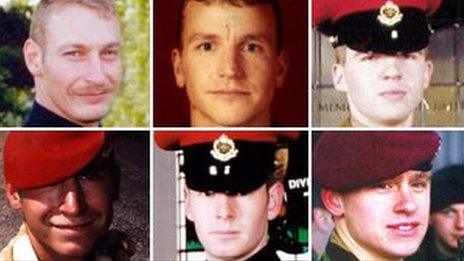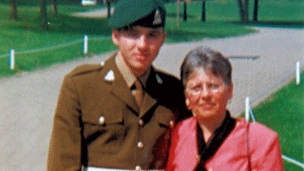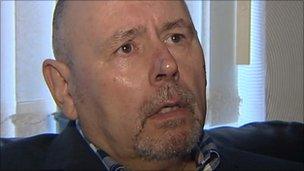Red Cap death inquiry call on 10 year anniversary
- Published

The six men were all based at Goojerat Barracks in Colchester, Essex
A decade on from the massacre of six British soldiers in Iraq, there are fresh calls for an independent public inquiry into their deaths.
The killing of the Red Caps by an angry mob in Majar al-Kabir, in the then British-occupied Maysan Province of southern Iraq, remains one of the most controversial episodes involving British troops in that country.
But the men - Simon Miller; Paul Long; Russell Aston; Ben Hyde; Tom Keys and Simon Hamilton-Jewell - did not die during the coalition forces' attempts to conquer Iraq; they died after the fall of Saddam Hussein when they were meant to be helping train the emerging Iraqi police force.
Two of the families - with the backing of an MP - are now demanding an independent public inquiry to look at the massacre, and to explore more fully what might have been done to prevent it.
The MoD said that the deaths had already been fully investigated.
The soldiers were killed by a mob while defending a police station in Al Majar al-Kabir, 120 miles north of Basra on 24 June 2003.
The families claim the Red Caps were not given enough ammunition and had "poorly functioning radio equipment" which left them unable to summon help when attacked.
Also controversial, they say, is the interpretation of an understanding between British forces and local Iraqis in Majar al-Kabir over weapons searches.
British paratroops became involved in a confrontation with Iraqis in the town who, it is thought, believed those troops should not have been there due to this agreement. The paratroops left but the "enraged mob" then turned on the Redcaps trapped inside the police station.
'Flawed investigation'
The mother of Cpl Paul Long believes the army's own internal inquiry was not thorough enough.
Pat Long, from South Tyneside, said: "It was the army investigating the army.
"We just want a public inquiry so they can't hide anything from us, which we are sure they are."

Pat Long with her soldier son Cpl Paul Long in 2000
Mrs Long has launched legal proceedings which she hopes will force the government to hold that inquiry.
John Miller, from Washington, Tyne and Wear, and the father of Cpl Simon Miller, also wants a public inquiry, although he is not involved in the legal case.
He described the army's own investigation as "flawed".
"I want it all to come out. We need the MoD to accept responsibility for what happened," he explained.
The families are being backed by Jeffrey Donaldson, a member of the House of Commons Defence Select Committee and a Democratic Unionist Party MP.
Mr Donaldson said: "There is a public interest here and I think the public, and especially the families, are entitled to be involved in the process of inquiry.
"The internal army inquiry did not include the families in the same way that a public inquiry would enable them to ask the questions which are important."
The other Red Caps who died were L/Cpl Benjamin Hyde, of Northallerton, North Yorkshire, Sgt Simon Hamilton-Jewell, 41, from Chessington, Surrey; Cpl Russell Aston, 30 from Swadlincote, Derbyshire; L/Cpl Tom Keys, 20, from Bala, North Wales.
'No practical purpose'
In 2006, the coroner's inquest into the deaths recorded a narrative verdict of unlawful killing, and the coroner wrote to the army making recommendations about how to avoid similar tragedies in future.
However, an earlier internal army inquiry in 2004 found "no conclusive evidence" to demonstrate the deaths could have been prevented.

Cpl Simon Miller's father said the MoD needed to accept responsibility
In response to demands for a fresh investigation, the MoD said its thoughts remained with the families but that the men's deaths had been "extensively investigated" and no practical purpose would be served by a public inquiry.
Attempts to bring Iraqis suspected of involvement in the killings to trial have not been successful, with charges against two men dismissed by a court in 2010.
However, other outstanding warrants have been issued against other suspects, and the families want the UK authorities to exert more pressure on their Iraqi counterparts to bring suspects to trial.
The Foreign and Commonwealth Office said in a statement: "This issue needs to be investigated by authorities in Iraq.
"We have raised this formally with Iraqi authorities and will continue to do so."
- Published12 February 2012
- Published10 October 2010
- Published10 October 2010
- Published15 August 2010